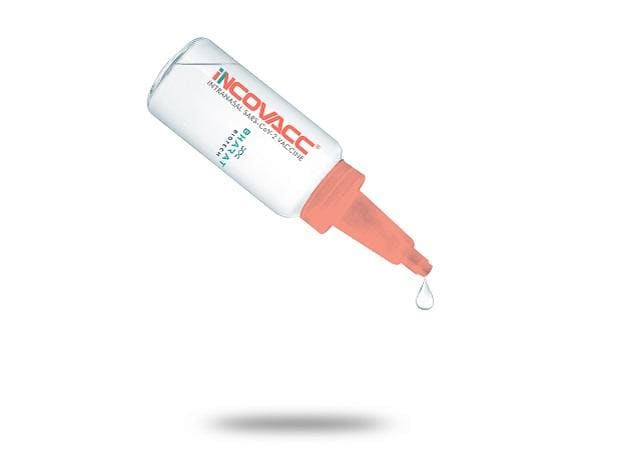Bharat Biotech’s intranasal Covid-19 vaccine iNCOVACC has received the Indian drug regulator’s nod to be used as a heterologous booster (a mix-and-match dose after the primary dose). iNCOVACC has got approval for restricted use in emergency situations on those aged 18 years and above, for heterologous booster after two doses of either Covishield or Covaxin.
This nasal vaccine becomes the second-approved Covid-19 vaccine in India, after Biological E’s Corbevax, which can be used as a mix-and-match booster shot.
In September, the company received the Drugs Controller General of India’s (DCGI’s) approval for this vaccine, making it the second intranasal Covid-19 vaccine in the world, after CanSino Biologics vaccine, which got approval from the Chinese regulator the same month. But the DCGI had approved iNCOVACC as a primary dose vaccine for Covid-19.
The company was thus awaiting approval for administering the vaccine as a booster shot, after Covishield or Covaxin shots. At the moment, not many are left in the eligible population who have not taken a single shot of the Covid-19 vaccine. Therefore, the company had no potential market for iNCOVACC as a primary two-dose regimen.
In September, Krishna Ella, chairman and managing director, Bharat Biotech, admitted that there was hardly any demand. He said: “Despite lack of demand for Covid-19 vaccines, we continued product development in intra-nasal vaccines to ensure that we are well prepared with platform technologies for future infectious diseases.”
The company has done clinical trials for the vaccine’s use as a heterologous booster dose after Covishield and Covaxin – and submitted the results of the same to the DCGI. The booster dose study was conducted for safety and immunogenicity on around 875 subjects
Bharat Biotech claimed that iNCOVACC is the world’s first intranasal vaccine for Covid to receive approval for the primary two-dose schedule, and also for heterologous booster.
iNCOVACC is a chimpanzee adenovirus-based vectored recombinant nasal vaccine that has been specifically formulated to allow intranasal delivery through nasal drops. The nasal delivery system has been designed and developed to be cost-effective in low- and middle-income countries, the company said. iNCOVACC is stable at 2-8°C.
Bharat Biotech sources said that there would be no scalability issue for the intranasal vaccine, which is based on the viral vector platform. Bharat Biotech’s Covaxin (inactivated virus vaccine) had issues with fast scaling-up due to low yields. A source told Business Standard earlier that production can be scaled up to 1 billion annual doses for the nasal vaccine easily.

Intranasal Covid-19 vaccines can prime the immune cells in the thin mucous membranes of nose and mouth — the spots through which the Sars-CoV-2 virus enters the body. Therefore, it can stop the virus from replicating at its entry, and thus prevent it before it spreads to lungs and other parts of the body. Vaccine developers feel that mucosal vaccines will be successful in preventing mild cases of illness and blocking transmission to other people.
The Hyderabad-based company has already established large manufacturing capabilities at multiple sites across Gujarat, Karnataka, Maharashtra, and Telangana, the company said on August 15.
This vaccine was developed in partnership with Washington University-St Louis, which designed and developed the recombinant adenoviral-vectored constructs and evaluated them in preclinical studies for efficacy. Product developments related to preclinical safety evaluation, large-scale manufacturing scale-up, formulation, and delivery device development, including human clinical trials, were conducted by Bharat Biotech. The Government of India partly funded product development and clinical trials through the Department of Biotechnology’s Covid Suraksha programme.
“We are excited by the expansion of the EUA for iNCOVACC as a booster, which enables this intranasal vaccine to be used by many more people, and hopefully curtail transmission,” said Michael S. Diamond of Washington University in St. Louis, who co-developed the nasal vaccine technology with Washington University colleague David Curiel. “This approval will increase the options for people to get vaccinated and protected against the SARS-CoV-2 virus during the ongoing pandemic.”
Note:- (Not all news on the site expresses the point of view of the site, but we transmit this news automatically and translate it through programmatic technology on the site and not from a human editor. The content is auto-generated from a syndicated feed.))



